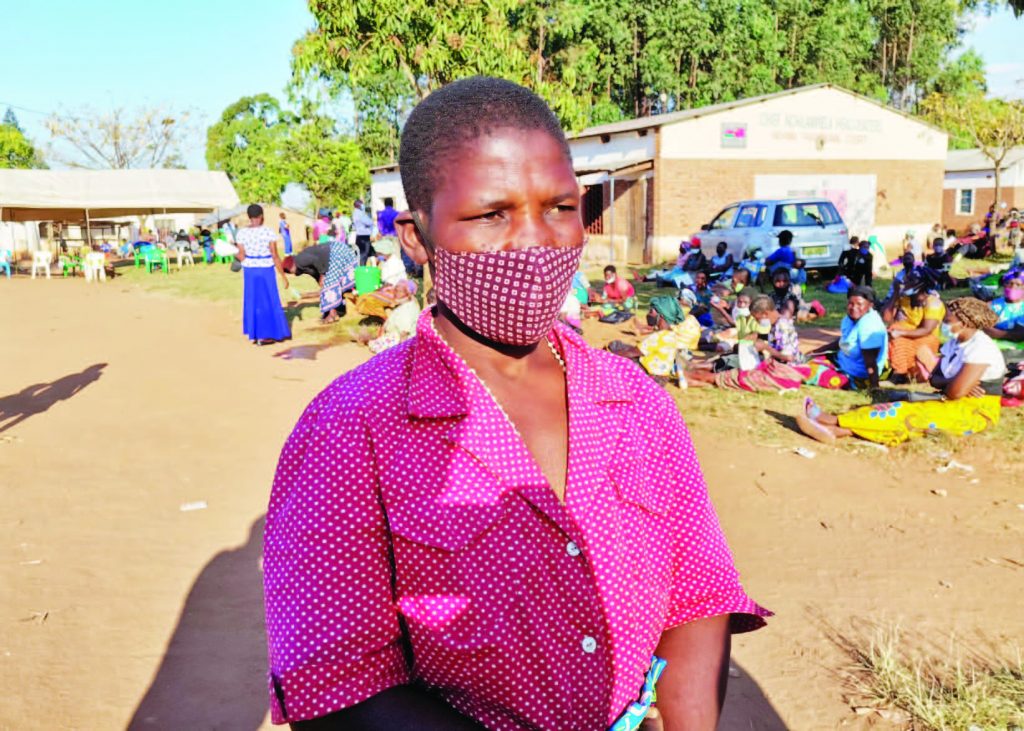Social cash transfer amid Covid
Forty-six-year-old Eliza Santo of Nchilamwera Village, Traditional Authority (T/A) Nchilamwera in Thyolo, never imagined that she could withstand deepening poverty amid the Covid-19 pandemic.
She was struggling to raise her seven children single-handedly when the pandemic surged, requiring her to stay home and avoid crowded settings.

“I was doing some piecework to support my family, but Covid-19 pandemic worsened my situation. People became extra cautious, choosing who could get into their homes or not,” says Santo.
As Covid-19 escalated, she started fetching firewood for sale so that she could earn money with which to buy provisions to feed her family. She says she had no option, but to venture into the illegal business depleting Malawi’s forests, because her family spent days without proper meals.
“It hurt so much seeing her family suffer,” says Santo. “But things kept getting worse as the earnings from the firewood weren’t enough to support my family.”

She says, at times, she survived on begging from relatives and friends.
As Santo was scraping through, she was listed among beneficiaries the Social Cash Transfer Programme introduced in the district in 2013. She receives about K26 000 monthly to help her overcome the harsh effects of the pandemic.
“Life started to change gradually. It became easy to support my family and I had to come up with best ways to utilise the money for my own survival,” says the mother.
Santo bought iron sheets for her grass-thatched house, chickens for sale and dairy cows. She also saves part of the money with a village banking group.
Through such investments, she manages to support her life on day-to-day basis and has few challenges she has to deal with.
Senior Chief Nchilamwera says the social cash transfers have lessened poverty levels among the poorest of the poor.

“Most households no longer find it hard to survive amid the Covid-19, which has affected rural dwellers too. Thanks to the programme, many families support themselves, do business and acquire assets they want,” he says.
Thyolo Central legislator Ben Phiri says the social cash transfers are well-executed to benefit the ultra-poor.
However, he urges beneficiaries to spend wisely—targeting their most pressing needs, not luxuries.
“It is pleasing that some have managed to set up small-scale businesses, others have bought dairy cows and even building houses. The benefits are visible,” says Phiri.
Beneficiaries receive cash transfers every two months. The sum ranges from household to household depending on a number of factors, including the number children in the homestead.
During the cash-outs, the households received K14 000 to K20 000 each.
Thyolo is the only district where the SCTP is fully supported by the government. There are 78 871 beneficiaries in 17 876 targeted households.
Nationwide, the programme targets 1 283 601 people in 293 632 households. The list of beneficiaries is dominated by labour-constrained and ultra-poor households, including widows, orphans, women-headed households, children raising fellow children and the elderly.
Minister of Gender, Community Development and Social Welfare Patricia Kaliati urges the beneficiaries to use the money prudently.
“The money is given to help beneficiaries support themselves in numerous ways. They can use it to buy nutritious foods or even go to hospitals to access medical care when they are sick,” she says.
The United Nations Children’s Fund (Unicef) provides technical support for operations of the Social Cash Transfer Programme.
However, Unicef reports that despite Treasury increasing funding to the programme from K650 million to K3 billion in the 2020/21 Budget, the amount is still not sustainable.
Apart from Thyolo, the other 27 districts are funded by donors. This includes the World Bank (11 districts), the German Government through KfW (seven districts), the European Union (seven districts) and the Irish Aid (two districts).





